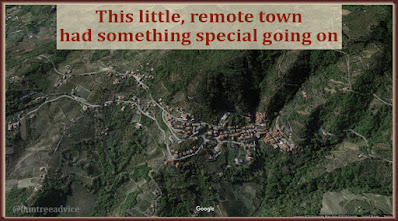You can get real insight into your ancestor's hometown by looking closely at its birth, marriage, and death records.
Not long ago I discovered the original hometown of my 2nd great grandmother, Colomba. She's the only one of my 2nd great grandmothers to leave Italy and settle in America. I wanted to know which town she left behind.
I had to piece together bits of evidence to learn her hometown. I discovered Colomba was born in 1845 as Vittoria Colomba Consolazio in the town of Santa Paolina, Avellino, Italy. By the time I learned this, I already had years of experience reading and documenting the vital records from a few of my nearby ancestral hometowns.
 |
| This town stood out among its neighbors. Reading through all the records uncovered the differences. |
But Santa Paolina looked different. It's a very small town. Very small. Most of the marriages in the 1800s involved a partner from another town because there weren't enough potential spouses to go around. That was the case with my 2nd great grandparents. Antonio Saviano came from another town to marry Vittoria Colomba Consolazio in Santa Paolina. Before long, they moved back to his hometown.
Apart from importing marriage partners, Santa Paolina had another noticeable difference. Santa Paolina's men had better jobs. They weren't working their land to survive. This town had a lot more tradesmen (bricklayers, blacksmiths, and manufacturers) and professionals (merchants, notaries, and doctors).
 |
| So many spouses came from another town. What drew them to this spot? |
This little town is in a stream-filled valley at the foot of a mountain where prehistoric man was known to live. The town's craftsmen from the Neolithic age (which ended about 2000 BC) produced fine pottery. Today the town is known for its wines and handmade lace. Records of this town date back to the year 1083. My roots in the town may run that deep.
Was it their centuries-deep roots that made this town different than its neighbors? Did their fertile land ensure the wealth of the vineyard owners? Did that attract young men and women from other towns to marry into Santa Paolina families? Did it allow people the "luxury" of being craftsmen instead of laborers?
When my 2nd great grandfather Antonio came to Santa Paolina for marriage, he was a shoemaker. He came from such a small town, I walked up and down most of it in a few minutes last year. Antonio had a different occupation each time one of his children was born. He was a bricklayer, a manufacturer, a farmer, a driver, and a merchant.
Based on marriage records, it seems my 2nd great grandmother's brothers may have inherited the family's land. That may be why Vittoria and Antonio moved back to his hometown. It may also be why Antonio kept changing professions.
If Vittoria's father did overlook her, that may have encouraged my 2nd great grandparents to come to America. According to the U.S. census, 10 years after arriving in New York City, 67-year-old Antonio had his "own income". He retired soon after. His family never seemed to want for anything, and Antonio was respected in his community. It looks like my 2nd great grandparents made the right decision.
Thanks to DNA, I've discovered some distant cousins with shared roots in Santa Paolina. I'm busily working to fill out our common branches. Somewhere in those documents I may find out why this town was so different than its neighbors.
What can vital records tell you about your ancestor's hometown when they lived there?
And speaking of what vital records can tell you:
No comments:
Post a Comment
You may leave an anonymous post if you have no Google account. The author screens each comment for spam before it appears here. So don't bother to spam.